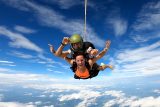What Planes Are Used for Skydiving?
Blog
 Posted by: Curtis White
10 months ago
Posted by: Curtis White
10 months ago
When you think of flying in an airplane, you may picture a commercial or passenger plane that you fly in when traveling. While you can’t exactly skydive from a passenger plane, there are several smaller airplanes you can jump from – and people do all the time! So, what planes are used for skydiving? We’ve got the list of some of the most popular skydiving aircraft used in the industry along with their specs!
Popular Skydiving Airplanes
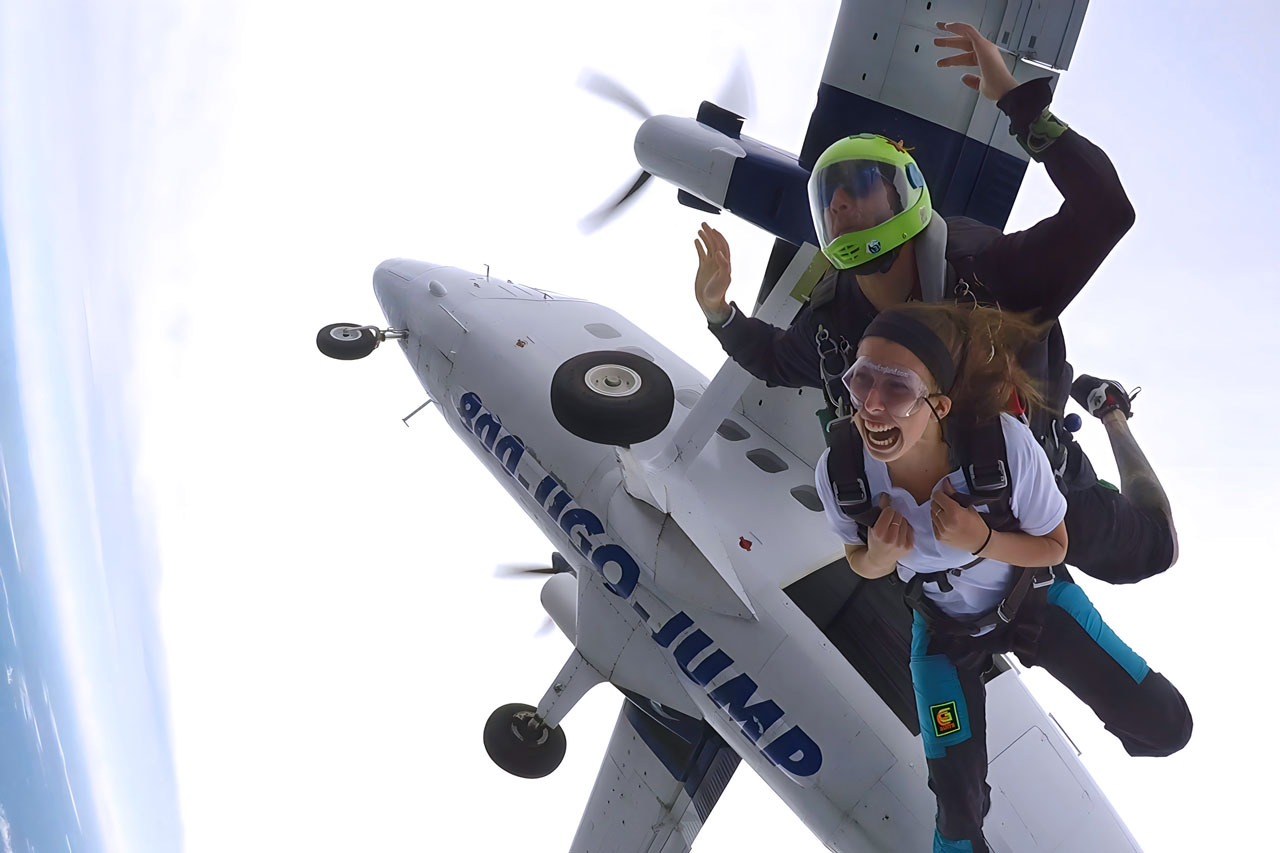
Cessna 182
What is the best small plane for skydiving? If you’ve laid eyes on the Cessna 182, its compact size might have you asking, “Can you skydive out of a Cessna?” Don’t be deceived! This mighty little aircraft is a top choice in the skydiving world and is one of the most commonly used skydiving airplanes in the biz! Renowned for its affordability, accessibility, and reliability, the Cessna 182 stands out as a favorite amongst skydiving centers all over the world (and especially in the U.S.).
This airplane can carry four skydivers at a time (two tandem pairs), making it the perfect aircraft for tandem skydiving couples, best friends, or anyone you’re looking to share this experience with in a more private setting. The door on the airplane swings up like a garage door, with a small platform with a strut for skydivers to use for support during their exits.
Here’s a closer look at the Cessna 182’s typical skydiving specs:
- 4 passengers
- 10,000 feet standard exit altitude
- 20-minute climb to altitude
Cessna 208 Grand Caravan
The Cessna 208 Caravan sounds like it’s just a beefier Cessna 182, but it is much more than that. The Cessna Caravan is the largest single-engine airplane ever produced by Cessna, so comparing it to the Cessna 182 is like comparing an eagle to a pigeon. Compared to the 182, you get up to five times as many people on board and you’ll get to a higher altitude faster. The door on the Caravan is much bigger compared to the 182, with lots of space for exits and two benches for skydivers to sit during the ascent.
What’s cool about the Caravan is that you can make improvements to it to make it better, faster, stronger. For example, our super-fast 900 HP Blackhawk Caravan can hold more than the average Caravan (22 passengers)!
Here’s a closer look at the Cessna 208 Grand Caravan’s typical skydiving specs:
- 15 – 22 passengers
- 13,500 feet standard exit altitude
- 10 to 15-minute climb to altitude
Twin Otter
The Twin Otter is a very popular and common twin-engine airplane used for skydiving operations. It is beloved by skydivers because of its quick climb to altitude and spacious accommodations.
Although loved by many, the Twin Otter can be a bit pricey, so you can only catch this aircraft at specific dropzones that have the means to meet the minimum occupancy to send it.
Here’s a closer look at the Twin Otter’s typical skydiving specs:
- 21-22 passengers
- 14,000 feet standard exit altitude
- 15-minute climb to altitude
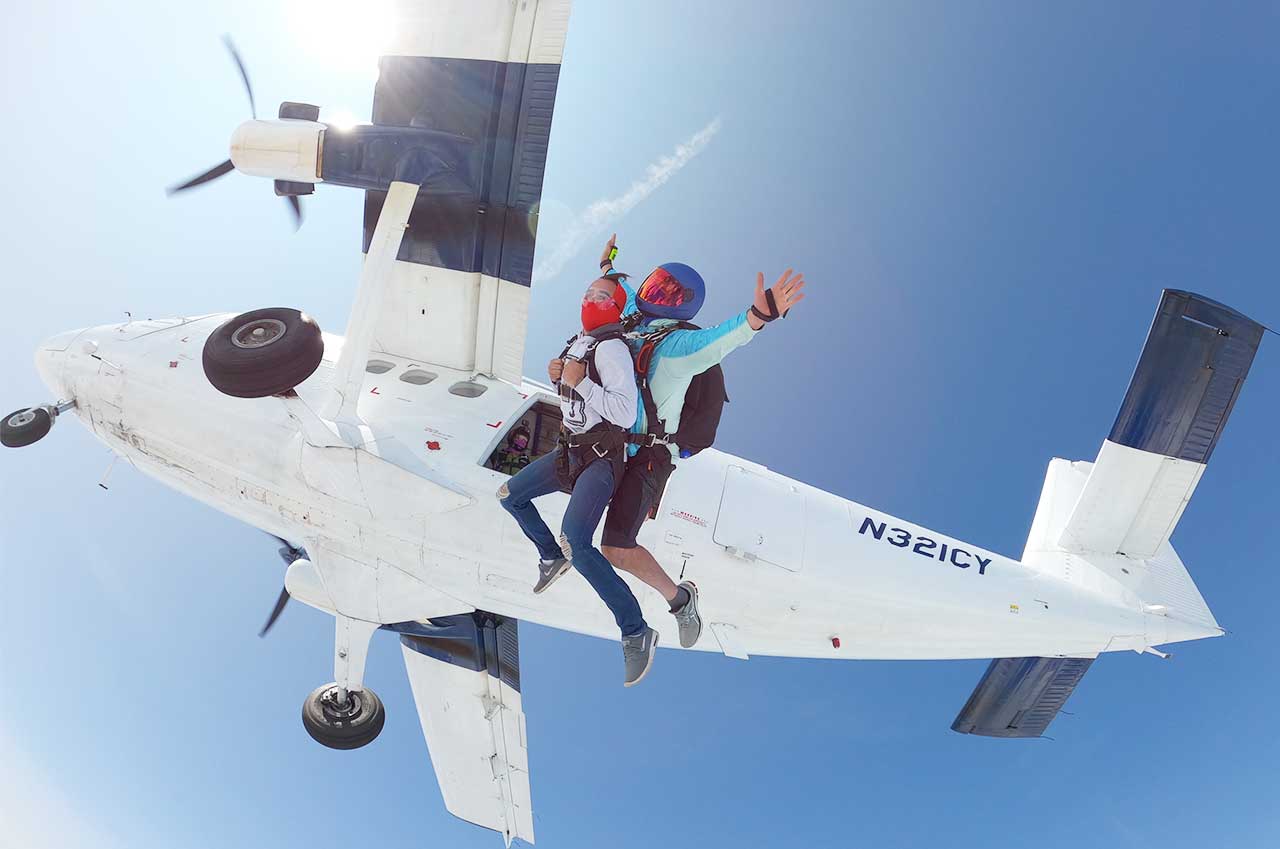
King Air
The King Air is one of the most desirable skydiving aircraft planes, mostly because it can get you to 14,000 feet in just under 10 minutes! Why does that matter? Well, less climb time means more time for more jumps!!
Here are the typical skydiving specs for the King Air:
- 14 passengers
- 14,000 feet standard exit altitude
- 10-minute climb to altitude
Skyvan
The skyvan – a bold and boxy aircraft – is known as the unicorn of the skydiving industry because of its unique exit door located at the back of the airplane. Yep, this means that the whole back side of the airplane opens up, making a clean and spacious exit that you literally can just walk out of!
This plane is perfect for special skydiving events, or boogies, giving skydivers plenty of room to get creative with super fun exits. The biggest downside is that the aircraft is crazy loud and a bit slow when climbing to altitude, but the exit door alone makes it all worth it!
Here are the typical skydiving specs for the Skyvan:
- ~23 passengers
- 14,000 feet standard exit altitude
- 20-minute climb to altitude
PAC
Fun fact: the PAC is the only aircraft that was specifically designed for skydiving. All other skydiving airplanes have been modified from their original purpose to become suitable for skydiving. The PAC isn’t the fastest plane when making the climb to altitude but it gets the job done!
Here are the PAC’s typical skydiving specs:
- 16-17 passengers
- 18,000 feet standard exit altitude
- 15-20 minute climb to altitude
CASA C-212
Ahh … the CASA 212, another favorite amongst skydivers because of its rear tailgate exit door and 32-jumper max capacity. If you’re looking to do larger formations and big-ways, you simply can’t do it as efficiently without this skydiving aircraft!
Here are the CASA’s typical skydiving specs:
- 32 passengers
- ~ 18,000 feet standard exit altitude
- 20 minute climb to altitude
Dornier G92
A popular skydiving plane in Europe, the aircraft is a twin turbine with a high wing and fast climb to altitude. This is a great plane to turn multiple loads at a fast-paced dropzone. Skydivers also love this aircraft because of its large sliding door, making it great for big exits.
Here are the typical skydiving specs for the G92:
- 15 passengers
- 15,000 feet standard exit altitude
- 11 minutes to altitude
Pilatus Porter
Although the Pilatus Porter is uncommon in the United States, it is a top-rated and common skydiving aircraft all across Europe. The Porter is the perfect jump plane for dropzones that are too busy for a small Cessna 182, but not quite busy enough to have a larger Caravan or twin turbine. With a high wing, sliding door, and large step outside the door, the Porter is a fun plane for skydivers to jump out of. The climb to altitude can be moderately quick but varies depending on whether it is turbine or piston-powered.
Here are some of the typical skydiving specs for the Pilatus Porter:
- 10 passengers
- 20,000+ feet standard exit altitude
- Time to altitude varies
Now that you’re a jump plane expert, you can feel confident booking a jump from our one-of-a-kind Blackhawk Caravan at Skydive New England! Come see what all the buzz is about. Blue skies!
Enter to Win a Free Skydive
Join our email list and enter to win a free tandem skydive. Drawings in April and December; winner announced on social media.
You’ll get a $10 coupon toward a tandem just for signing up! Must be 18 and under 240 lbs to jump.
*By submitting this form, you are consenting to receive marketing emails from Skydive New England, 40 Skydive Lane, Lebanon, Maine 04027. You can revoke your consent by using the SafeUnsubscribe link located at the bottom of every email. Emails are serviced by Constant Contact.
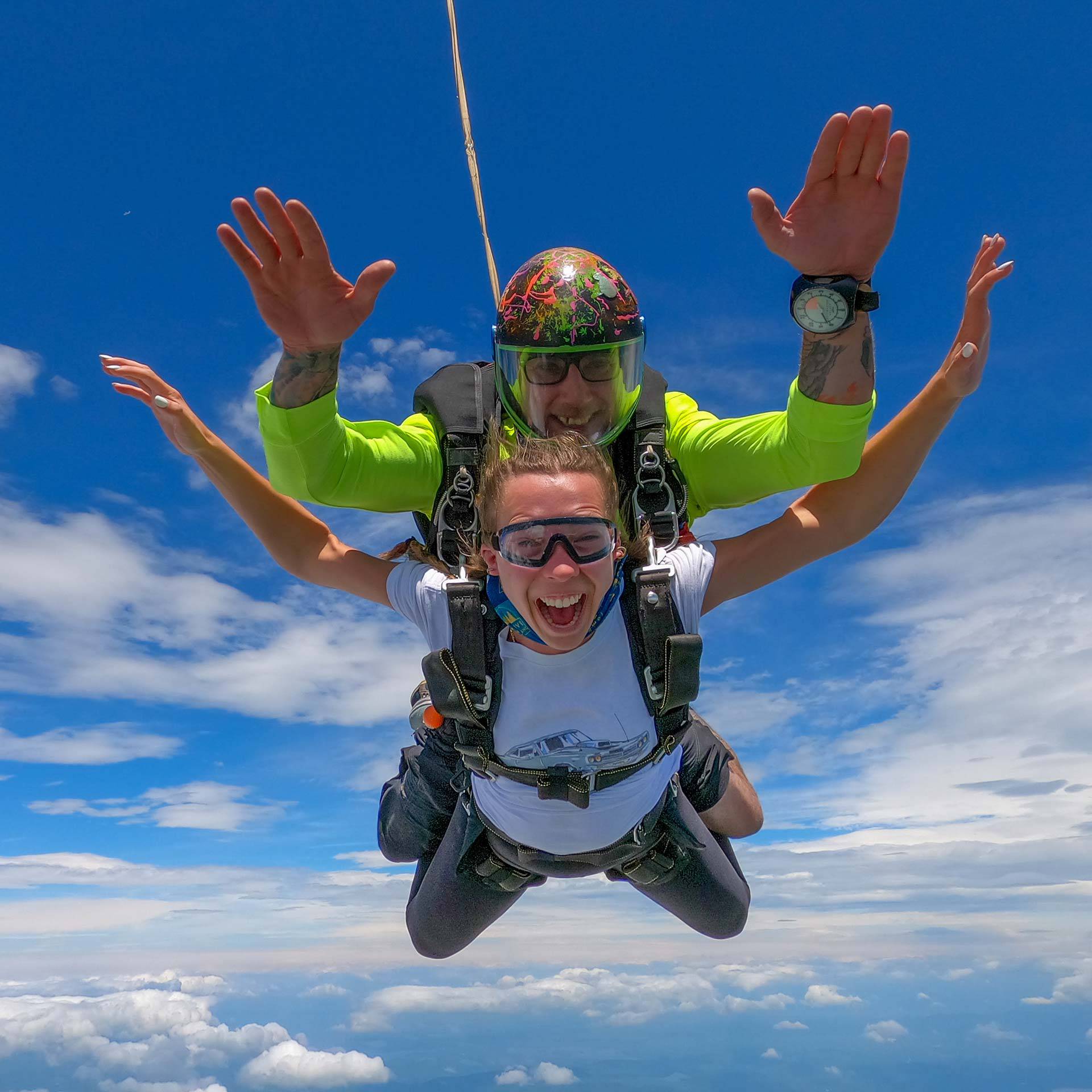
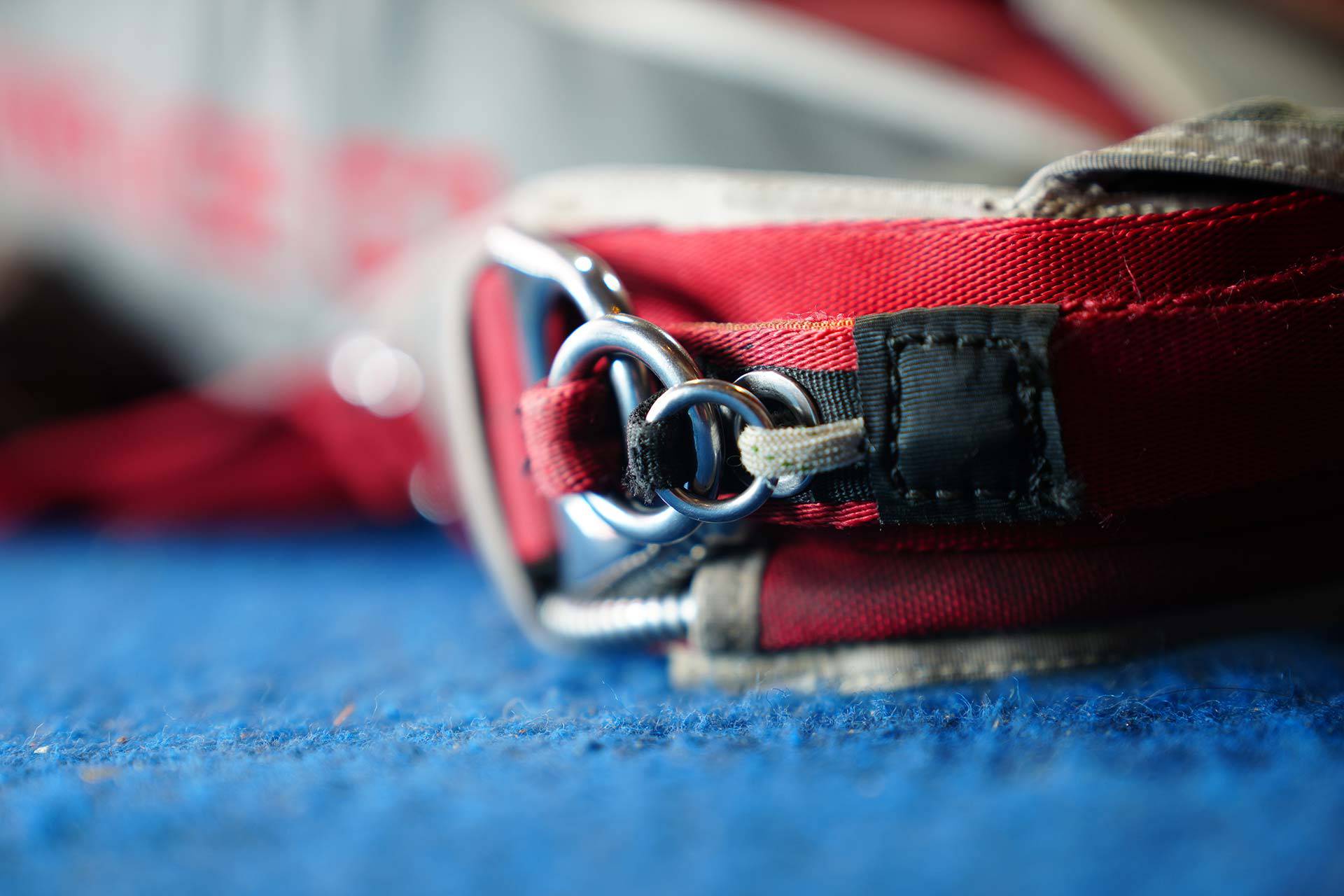
Even More Wicked-Fun Than It Looks!
Come see why the biggest DZ in New England is also the best.

